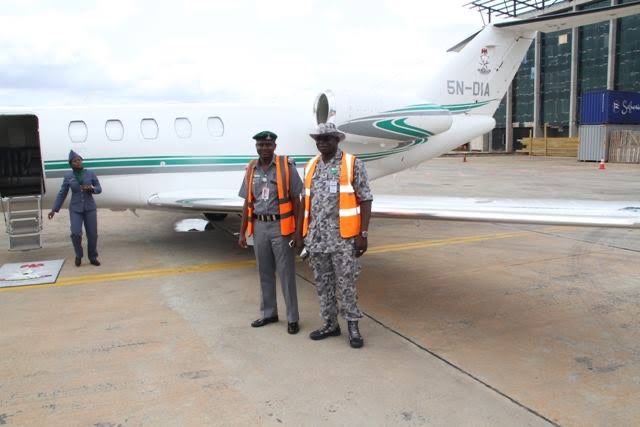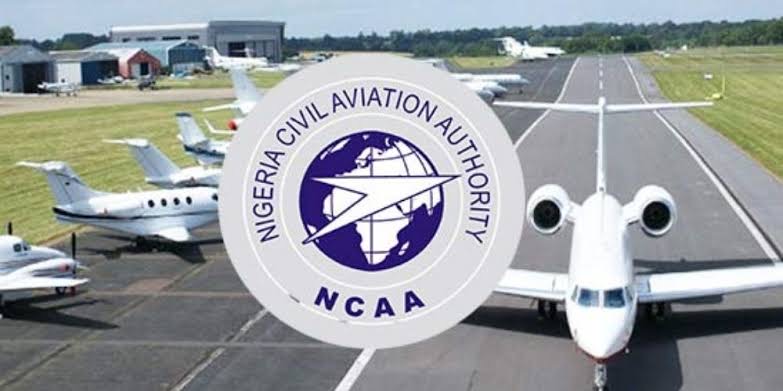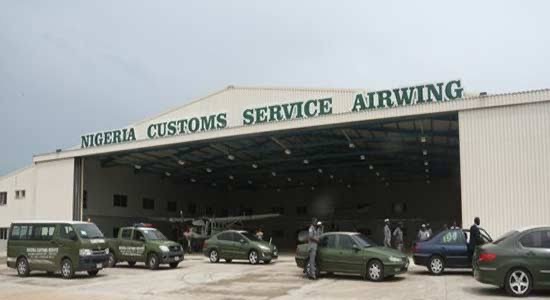The Federal Government, through the Nigerian Customs Service, has launched new measures to crack down on operators of private jets illegally imported into Nigeria, a report has revealed.As a result, over 80 private jet operators are expected to arrive at the NCS headquarters in Abuja with their aircraft import documents. According to a Customs public notice, the special inspection of aircraft imports, which begins on Wednesday (tomorrow), is set to continue for 30 days.
The notice seen by one of our correspondents reads in part, “The Nigerian Customs Service has announced the inspection of civil aircraft operating in Nigeria. The objective of the measure is to identify civil aircraft illegally imported without documents, thereby ensuring due importation and maximum tax revenue.”According to the notice, owners and operators of private jets in the country will be required to bring along some relevant documents.These include the Aircraft Registration Certificate, Nigerian Civil Aviation Authority Flight Operations Compliance Certificate, NCAA Maintenance Compliance Certificate, NCAA Non-Commercial Flying Permit, and Temporary Import Permit (where applicable).
The latest plan to crack down on operators of illegally imported private jets comes more than a year after the Federal Government suspended the measure. Over the past three years, the government had been planning to collect billions of dollars in import duties from some private jet operators who had been exploiting certain technical loopholes to avoid paying import duties.After the Hameed Ali-led NCS took some significant steps to restore revenues, some private jet owners paid the mandatory import duties. However, some private jet owners and operators in the country are still not paying their statutory obligations.

Many private aircraft operators in the country are alleged to have exploited technical loopholes in the regulations to fraudulently obtain temporary import permits from the Nigerian Customs Service instead of paying statutory import duties on imported aircraft.The TIP is initially valid for 12 months but can be extended twice for six months as per regulations. However, several private jet operators in the country have extended their TIPs indefinitely, which has prompted Customs to take fresh action in the past.
According to new findings from our correspondent, as many as 80 private aircraft operators are expected to submit their aircraft import documents for verification as part of the month-long exercise. “Based on the data available to us, we expect more than 80 private aircraft operators to be included in the review.”These include operators of around 20 civil aircraft imported since the last review,” a senior official familiar with the review told Journalists on condition of anonymity as he was not authorized to comment on the matter. The procedure is aimed at paying mandatory import duties, which aircraft operators who fail to pay will be grounded from operating their aircraft.Some stakeholders said TIP is a fraudulent means of evading mandatory import duties. Importers of private jets, especially those registered overseas, have to pay 5 percent of the private jet’s price as import duty.But customs officials said some owners often do not want to pay import duties due to the high price of private jets. Instead, operators prefer to obtain TIP on the pretext that the aircraft will enter the country only temporarily.
These refer to Article 24 of the International Civil Aviation Organization (ICAO) Convention on the Exemption from Customs Duties of Civil Aircraft Operating Temporarily in a Country.However, the new customs administration seems willing to make all operators pay import duties. Unconfirmed sources say that the high exchange rate could leave about 100 billion naira of import duties unpaid on the importation of civil aircraft.However, this analysis depends on whether customs decides to introduce a 25 percent penalty that such aircraft owners must pay for late payment. The 25 percent penalty is in addition to the 5 percent statutory import tax. It is unclear whether civil airlines will cooperate with the government in paying the duties.Meanwhile, the NCS National Public Relations Officer, Mr Abdullahi Maiwada, on Monday confirmed the review which is scheduled to commence on Wednesday.
Speaking to Journalists, when asked what steps the agency intends to take following the review, Maiwada said: “The relevant sections of applicable laws and regulations will govern our actions and inactions during and after the review.”Sometime in 2021, about 17 foreign registered private jet owners, including top businessmen, major commercial bankers, and other wealthy Nigerians, were dragged to court to stop the Federal Government from decommissioning their aircraft, over alleged non-payment of import duties.
This came after the Federal Government approved the decision of the Nigerian Customs Service to ground about 91 private jets for alleged refusal to pay import duties amounting to over 30 billion naira.In the letter, the NCS directed the Nigerian Civil Aviation Authority, the Federal Airports Authority of Nigeria, and the Nigerian Airspace Management Agency to immediately ground the affected private jets.

However, due to conflicts and differences of opinion between government agencies, the relevant government agencies have failed to ground the private jets. The jet owners who sued the government sought a judicial review on whether they were legally required to pay import duties on the controversial private jets.They were suing the government over the foreign shell companies and trusts through which they purchased foreign-registered jets. Often, Nigerians and companies purchase foreign-registered private jets through foreign shell companies and trustees.Experts believe that Nigerians prefer to register their jets in foreign countries such as the US, UK, and the Isle of Man to preserve the value of the aircraft when they are sold.
This also results in cheaper insurance payments.According to court documents, the 17 plaintiffs are mostly foreign entities representing Nigerian jet owners, including Aircraft Trust and Financing Corporation Trustee, UAML Corporation, Bank of Utah Trustee, Masterjet AVIACAO Executive SA, and Cloud Services Limited.Others include MHS Aviation GmbH, Murano Trust Company Limited, Panther Jets, SAIB LLC, Empire Aviation Group, and Osa Aviation Limited. The list also includes BUA Delaware Inc., Flying Bull Corporation Limited, Air Charter Inc., Sparfell Aviation GmbH, WAT Aviation Limited, and ATT Aviation Limited. The NCAA and Customs were named as defendants in the suit.However, in a written cover letter in support of the first defendant’s preliminary objection, the court document states in part:
“The simple facts of this case are that the first defendant has discovered that some aircraft operators are importing the same under the guise of temporary aircraft.”The NCS had in 2021 commenced a review of import duties on private jets imported into Nigeria since 2006.Following incidents where several private jet owners were allegedly found to have failed to pay statutory import duties to the national treasury under the guise of temporary import permits, the then Commissioner of Customs, Hamed Ali, set up a review committee to review all TIPs and related matters and check the import documents of all private jets in the country.
At the end of the 60-day exercise, Customs had cleared 57 private jets licensed for commercial charter operations and issued aircraft pilot certificates. However, it was found that 29 private jets whose owners presented for inspection had not paid import duties.
Customs also compiled a list of another 62 private jets whose owners did not turn up for inspection but were required to pay import duties. But other private jet owners who wanted to pay the import duties were given a 14-day ultimatum to settle their debts.It remains unclear how many jet owners have since paid their fees. It remains to be seen how hard the new customs authorities intend to persuade powerful private jet owners to pay the import duties.

































